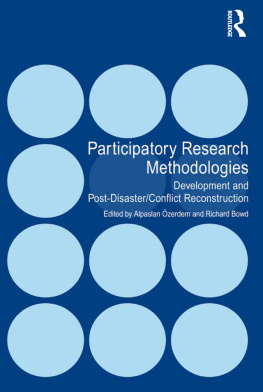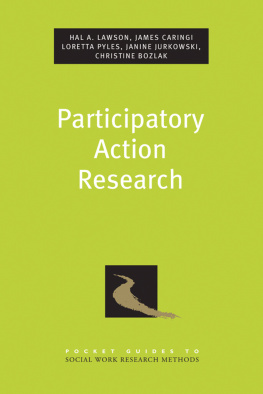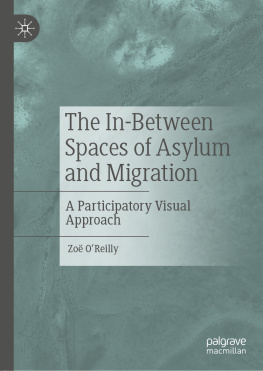ETHICAL PRACTICE IN PARTICIPATORY VISUAL RESEARCH WITH GIRLSTransnational Girlhoods
EDITORS: Claudia Mitchell, McGill University; Bodil Formark, Ume University; Ann Smith, McGill University; Heather Switzer, Arizona State University
Girlhood Studies has emerged over the last decade as a strong area of interdisciplinary research and activism, encompassing studies of feminism, women and gender, and childhood and youth and extending into such areas as sociology, anthropology, development studies, childrens literature, and cultural studies. As the first book series to focus specifically on this exciting field, Transnational Girlhoods will help to advance the research and activism agenda by publishing full-length monographs and edited collections that reflect a robust interdisciplinary and global perspective. International in scope, the series will draw on a vibrant network of girlhood scholars already active across North America, Europe, Russia, Oceania, and Africa, while forging connections with new activist and scholarly communities.
Volume 1
The Girl in the Text
Edited by Ann Smith
Volume 2
Ethical Practice in Participatory Visual Research with Girls:
Transnational Approaches
Edited by Relebohile Moletsane, Lisa Wiebesiek, Astrid Treffry-Goatley, and April Mandrona
ETHICAL PRACTICE IN PARTICIPATORY VISUAL RESEARCH WITH GIRLS
Transnational Approaches
Edited by
Relebohile Moletsane, Lisa Wiebesiek, Astrid Treffry-Goatley, and April Mandrona
First published in 2021 by
Berghahn Books
www.berghahnbooks.com
2021 Relebohile Moletsane, Lisa Wiebesiek,
Astrid Treffry-Goatley, and April Mandrona
All rights reserved. Except for the quotation of short passages for the purposes of criticism and review, no part of this book may be reproduced in any form or by any means, electronic or mechanical, including photocopying, recording, or any information storage and retrieval system now known or to be invented, without written permission of the publisher.
Library of Congress Cataloging-in-Publication Data
Names: Moletsane, Relebohile, editor.
Title: Ethical Practice in Participatory Visual Research with Girls: Transnational Approaches / edited by Relebohile Moletsane, Lisa Wiebesiek, Astrid Treffry-Goatley, and April Mandrona.
Description: New York: Berghahn Books, 2021. | Series: Transnational Girlhoods; volume 2 | Includes bibliographical references and index.
Identifiers: LCCN 2020058134 (print) | LCCN 2020058135 (ebook) | ISBN 9781800730335 (hardback) | ISBN 9781800730342 (ebook)
Subjects: LCSH: GirlsResearchMethodology. | GirlsSocial conditionsResearch. | Participant observation. | Visual sociologyResearchMethodology.
Classification: LCC HQ798 .E84 2021 (print) | LCC HQ798 (ebook) | DDC 305.23082dc23
LC record available at https://lccn.loc.gov/2020058134
LC ebook record available at https://lccn.loc.gov/2020058135
British Library Cataloguing in Publication Data
A catalogue record for this book is available from the British Library
ISBN 978-1-80073-033-5 hardback
ISBN 978-1-80073-034-2 ebook
CONTENTS
Claudia Mitchell
Relebohile Moletsane, Astrid Treffry-Goatley, Lisa Wiebesiek, and April Mandrona
Naydene de Lange
Casey Burkholder
Astrid Treffry-Goatley, Lisa Wiebesiek, Naydene de Lange, and Relebohile Moletsane
Anna Chadwick
The Young Indigenous Womens Utopia with Katie MacEntee, Jennifer Altenberg, Sarah Flicker, and Kari-Dawn Wuttunee
Tamlynn Jefferis and Sadiyya Haffejee
Milka Nyariro
Jennifer A. Thompson
Hayley R. Crooks
Relebohile Moletsane, Astrid Treffry-Goatley, Lisa Wiebesiek, and April Mandrona
ILLUSTRATIONS, FIGURES, AND TABLES
Illustrations
Figures
Tables
FOREWORD
Claudia Mitchell
This new volume (Volume 2) in the Transnational Girlhood book series, Ethical Practice in Participatory Visual Research with Girls: Transnational Approaches goes, as the famous expression has it, thickly and deeply into the ethical considerations of what it means to do participatory visual research with girls and young women. Some of the books in this series are building on previous Special Issues of Girlhood Studies: An Interdisciplinary Journal. The first volume in the series, The Girl in the Text, edited by Ann Smith (2019), came out of a Special Issue. Likewise, Ethical Practice and the Study of Girlhood, guest edited by April Mandrona (2016), is the mainspring of this new volume. Taking as its point of entry participatory visual fieldwork with girls and young women in Indigenous and rural contexts in Canada and South Africa, the book also includes chapters on work done in Cameroon and Kenya, along with several other sites in Canada that are not directly related to indigeneity. Across all the sites, researchers grapple with critical questions related to the methods and tools of participatory visual research they are using such as photovoice, participatory video, and cellphilming, and also to the commitment to taking seriously the voices of the girls and young women with whom they work who are often the most marginalized in their communities. Importantly, cutting across this work is a focus on sexual and gender-based violence.
How are questions of ethical practice in participatory visual research complicated by the Research Ethics Boards and Committees that regulate all our research? Concomitantly, how do the issues raised here offer more nuanced considerations that could further inform the broad area of research ethics? I am struck, for example, by the fact that few of the issues addressed in this book are covered in my own universitys compulsory online Course on Research Ethics, although the university does ensure that those working with Indigenous communities follow specific protocols. The course does not reference the unique situation of girls and young women (although it does take up vulnerability in broader ways) or the special instances of rurality (or spatiality) and of working with visual data such as photos or videos. Furthermore, although it does address where data are going to be stored and for how long, the course offers no case studies of ownership when it comes to the issue of who owns the data or who determines how it is going to be used. I recognize, of course, that each of these points has its own particularity, and no single course is going to address them all. At the same time, however, what this mini-audit of what is not in this particular online course reminds us is that there is clearly a need to see up-close the situated and relational nature of ethical issues and to note how thoughtful and reflexive researchers are taking up these concerns.
The editors of this volume, three from the University of KwaZulu-Natal (UKZN), South Africa (Relebohile Moletsane, Lisa Wiebesiek, and Astrid Treffry-Goatley), and one from the Nova Scotia College of Art and Design (NSCAD) in Halifax, Canada (April Mandrona), know what it means to navigate the complexities of participatory visual research with Indigenous girls and young women, particularly in the context of sexual and gender-based violence. The research experience of the lead editor, Relebohile Moletsane, as the J. L. Dube Chair in Rural Education at UKZN and the director of the Centre for Visual Methodologies for Social Change, is exceptionally pertinent here, and the experience and expertise of all the other editors in working with participatory and arts-based methods is extensive.





